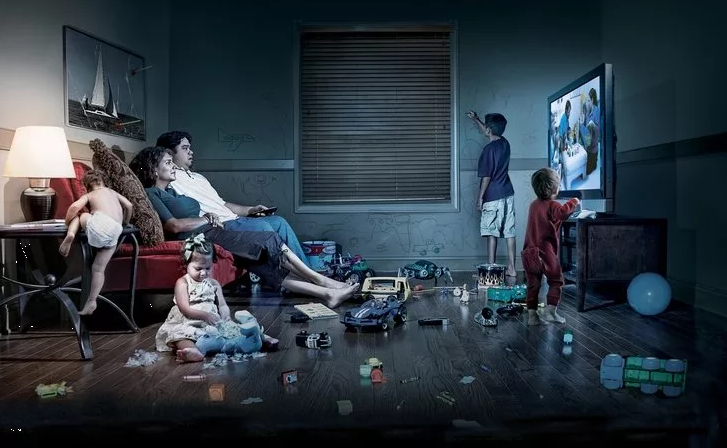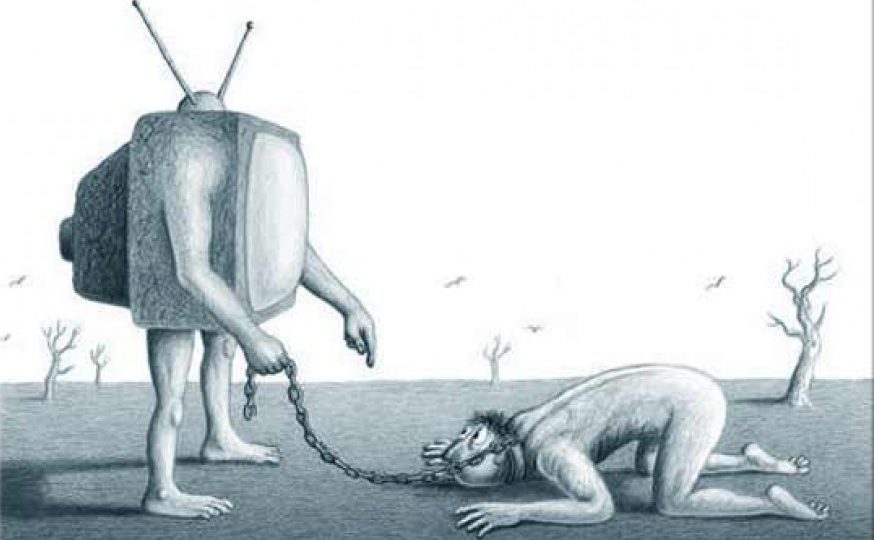“Zomboyashchik” or how TV controls your consciousness
Who doesn't like to watch a series or TV show on TV. Of course, this is a rhetorical question and a larger percentage of the population watches TV daily.
But is this leisure time safe? Successful people don’t watch TV; Jewish believers don’t even have it in their house. Perhaps there is a connection between failure and wasting time watching TV; and between success and refusal from TV.
The content of the article
How TV affects our consciousness
Our brain has a peculiarity - it cannot distinguish between real events and those happening on the screen. While watching a comedy, we experience pleasant emotions, and the brain sends a signal to release happiness hormones. But when you see a drama, an action movie, or a crime news report, the brain reacts to it as if it were a real situation. Adrenaline and stress hormones are released into the body.

This effect is confirmed by scientific fact:
- While watching TV, the cortex and subcortex of the brain turn off, as if they were sleeping. At this time, the peripheral nervous system is active. This system of work is inherent in animals that do not distinguish real life from a picture. (An example is the reaction of animals to their reflection).
Taking advantage of this feature, TV shows and advertising introduce frame 25 or other signs that our eyes cannot catch, but the subconscious mind records and recognizes this frame. These techniques are aimed at the subconscious, they are visible for a split second and the consciousness does not have time to notice them.In this state, the information the advertiser needs is stored in our “subcortex”. Ultimately, we believe that one detergent is better than another. Exhausting yourself until you lose consciousness is a healthy lifestyle, and low-fat yogurt is a healthy product, etc. and so on.
Thus, the information that is presented on television directly influences our consciousness, forcing us to make the choice that someone needs (and we’re not just talking about purchasing goods).
How does radiation affect our brain and psyche?
It just seems to us that watching TV is a harmless leisure activity. However, if you dig deeper, many people who are dissatisfied with their lives begin to look for “solace” on the silver screen; over time, television life in a series or reality show replaces the real world of a person. He becomes a “drug addict”, dependent on these programs. He lives in that world, events, emotions. And TV series are perhaps the most harmless thing you can become addicted to.

Watching your favorite TV series releases pleasure hormones in your body - endorphins. Often this activity leads to a complete absence of friends and interlocutors. A person does not need to do anything to get pleasure, just press a button on the remote control. And if you add “snacks” to such leisure time, which many do, then you get an addiction to TV and junk food. Which also leads to excess weight.
IMPORTANT! Watching TV for more than 3 hours a day has a negative impact on mental abilities. A person copes worse with planning, remembering and assimilating new information.
In 2001, based on 46 studies, it was found that watching television at an early age delays a child's further development.Nga this moment has already been established and proven by all neurologists, psychiatrists, pediatricians and speech therapists - a child should not watch cartoons or TV for more than 1 hour a day.
The fact is that when watching TV shows or cartoons, our brain only works at half capacity. He does not need to think and solve problems, as he would with a computer or board game. As a result, important lobes of the brain remain undeveloped, and their development in older age will be more difficult and longer. Hence the absent-mindedness and poor performance of children at school.

IMPORTANT! No matter how strange it may sound, psychologists are taking the side of computer games. They are able to develop thinking and logic, as opposed to mindlessly watching television. But this is not a panacea, it is the lesser evil. A creative activity that develops motor skills, design skills, and imagination (drawing, construction sets, modeling, just playing with your toys in an imaginary world and situations) will be more useful for a child.
Allowable TV time for children:
- 2-3 years – 30-40 minutes;
- 3-7 years – 1-1.5 hours;
- 7-13 years old – 2 hours.
The same thing happens with adults. Yes, we no longer need to solve equations and learn poetry by heart, depending on the profession, of course. But adult life has its own unresolved problems, difficult situations and success in all areas. By the way, memorizing poetry reduces the chances of diseases associated with mental activity (for example, sclerosis).
Influence during sleep, why you can’t sleep with the TV on
It often happens that you fall asleep during commercials without waiting for the continuation of the film. The situation is quite viable, but unsafe. Sleeping with the TV on can cause chronic fatigue, bad mood and headaches.

IMPORTANT! Any light source during sleep interferes with the production of the sleep hormone melatonin.
The light that the screen emits when turned on affects our brain as a signal about the coming day. It is detected even with closed eyelids, you can check this at home. So, this light signals the coming day, which means option 2: either it’s time to wake up or go to sleep early. As a result, you cannot sleep deeply. Namely, it is in the deep sleep phase that the most important processes of rest and recovery occur. As a result, in the morning you are a broken and unrested person.
ADVICE! If you have trouble falling asleep, turn off the TV 1-2 hours before bed. And remove all sources of flicker - smartphone, tablet, computer and e-readers. This will not irritate the nervous system and will help you get ready for sleep.
There is a second reason to turn off the TV before bed. While in a state of sleep, we continue to perceive the environment. Hence unpleasant dreams when we are cold and poor sleep in a hot room. We smell and sound, which means we can unconsciously perceive the transmitted information. Such a dream will resemble a hypnosis session - you will not remember what you heard in the dream, but this information will be deposited on a subconscious level.





